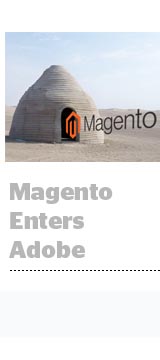
Adobe said Monday it will buy the ecommerce platform Magento for $1.68 billion. Magento’s 2017 revenue was $150 million, and the deal is expected to close by the end of August.
Ecommerce has long been a big hole in Adobe’s tech, even as competitors spent heavily to acquire Magento’s competitors. SAP has owned hybris since 2013 and two years ago, Salesforce bought Demandware for $2.8 billion.
Salesforce’s Demandware acquisition catalyzed Adobe’s decision to move in on Magento, according to Constellation Research founder and principal analyst Ray Wang, though John Mellor, Adobe’s VP of strategy, alliances and marketing disputed that notion, saying: “Our view has always been independent regarding what our competitors have done.”
Adobe claims it went after Magento because of its large developer community and because it can service both mid-market and larger enterprises and work with B2B and B2C companies.
That last point is a big deal to Adobe. In contrast, Salesforce’s Demandware specifically focused on high-end luxury brands, said Mellor.
“It was very B2C-centric,” he said. “I think Salesforce recognized that and acquired a B2B platform in CloudCraze. But that gets messy.”
Adobe, which has integrated with Demandware, hybris and Magento among other ecommerce platforms, took pains to emphasize that it would remain open.
Despite the success of Adobe’s partner model, Mellor said, customers want their ecommerce capabilities integrated with other marketing activities, which is why Adobe decided it needed ecommerce incorporated into Experience Cloud.
“The old way of thinking about commerce is it’s the destination, the end of a conversion funnel,” Mellor said. “Our view is that commerce can be built into part of the experience. If I’m doing video or display advertising, I should be able to embed commerce functionality into those touch points.”
The architecture of other ecommerce platforms is too rigid to allow that sort of functionality, said Adobe Experience Cloud EVP and GM Brad Rencher during a conference call.
If the execution matches the hype, Magento will give Adobe a unique value prop: an ability to close the loop in a way no other marketing cloud has. “The moment you see your first ad all the way through to where you’re transacting or purchasing the product,” Rencher said.
That possibility makes sense since Adobe is the only marketing cloud with a demand-side platform. In fact, it’s got two of them: TubeMogul for display and video and Media Optimizer for search, both in Adobe’s Advertising Cloud.
And Adobe claims that despite being a conglomerate of acquisitions, data can flow freely from one part of the Experience Cloud to the other. While Magento will need to be integrated, Mellor said it already works well with the rest of Adobe’s tech.
“Experience Cloud has a commerce integration framework working with ecommerce platforms generally,” he said. Magento is already certified within that framework.
It’s been an interesting journey for Magento, which was acquired by eBay in 2011 and integrated with its marketing stack until 2015, when eBay divested its marketing tech. Magento was taken private until Adobe snapped it up.
There are other ecommerce platforms that can service the enterprise space, said Jason Daigler, research director of Gartner’s digital commerce unit. He noted Intershop, Digital River and ElasticPath.
But Magento has had recent success in the enterprise market, which is what made it attractive to Adobe at this time.
“The Order Management and B2B offerings [Magento has] introduced in the last two years also make them a more complete solution than they were a few years ago,” Daigler added.
Now Magento will become the fourth pillar within Adobe Experience Cloud, which houses Advertising Cloud, Analytics Cloud and Marketing Cloud. Magento will become Adobe Commerce Cloud, just as Demandware became Salesforce’s Commerce Cloud.
Magento CEO Mark Lavelle will continue to run the Magento business inside the Adobe Experience Cloud, reporting to Rencher.
This post was syndicated from Ad Exchanger.

More Stories
Why Privacy Sandbox Testers Are Relieved Google Delayed The Cookie’s Demise
VML launches ‘Conquer the Weekend’ campaign for Ford
The Latest CMA Report Brings New Privacy Concerns to Google’s Cookie Deprecation Plans